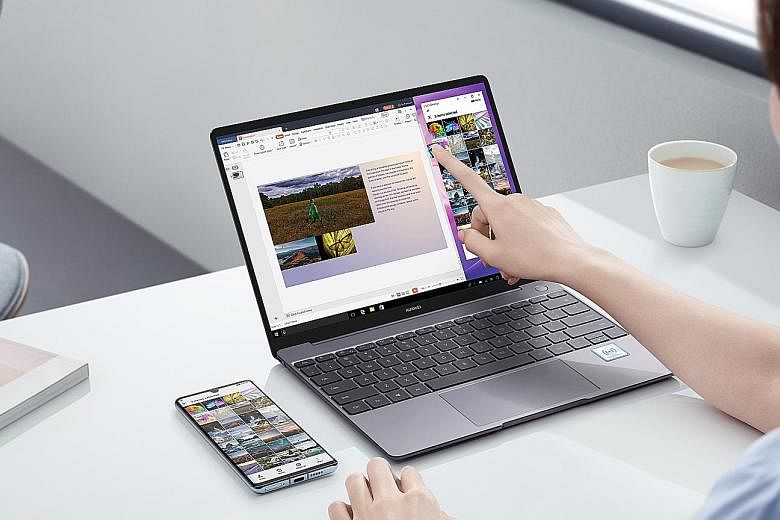After a year-long delay, Huawei has finally launched its MateBook series of Windows notebooks in Singapore.
The Chinese tech giant had originally planned to launch its laptops here in May last year. In fact, I was in the midst of testing one when the launch was cancelled after the United States imposed trade sanctions on the company.
But better late than never. The latest MateBook 13 as well as MateBook D 15 are here at last.
Unlike Huawei's smartphones, which are barred from using Google's apps and services by the US trade ban, the MateBooks are allowed to run the Windows 10 operating system.
My MateBook 13 review set ($1,598) comes with a 10th-generation Intel Core i5 processor, a generous 16GB of system memory, an entry-level Nvidia GeForce MX250 graphics chip and a 512GB solid-state drive. My only grouse is that it lacks the latest Wi-Fi 6 chipset. But all in all, the MateBook 13 offers good hardware specifications for its price.
But what impresses me the most is the notebook's build quality.
Its all-metal chassis is sturdy without much flex. The lid, too, has a certain heft from its metal construction and glossy touchscreen. I can open the lid using one hand, which is convenient when your other hand is occupied.
Because its 13-inch screen has a 3:2 aspect ratio, the MateBook is more squarish than the typical 16:9 models. This aspect ratio is ideal for office productivity work as it offers more vertical screen real estate.
The screen itself is bright, though its auto-brightness feature, which can be disabled, is a tad too aggressive at dimming the display. Its 1,440p display looks crisp.
The keyboard extends from one edge of the laptop to the other, which minimises the laptop footprint. The keyboard feels shallow with little key travel, but I like its tactile feel and large keys. I also like the clicky and accurate touchpad.
The MateBook's design, though, is derivative of Apple's MacBook. It also has only two USB-C ports (one on each side), mirroring the MacBook Air's scheme of two Thunderbolt ports. Thus, you will need a dongle to connect a standard USB-A device like a mouse or a storage drive.
-
FOR
• Compact and well-built
• Fingerprint sensor integrated with power button
• Screen-and file-sharing feature with compatible Huawei smartphones
• Crisp display
AGAINST
• No Wi-Fi 6
• Could do with more ports
SPECS
PRICE: $1,598
PROCESSOR: Intel Core i5-10210U (1.6GHz)
GRAPHICS: Nvidia GeForce MX250 2GB GDDR5
RAM: 16GB DDR3
SCREEN SIZE: 13 inches, 2,160 x 1,440 pixels
CONNECTIVITY: 2 x USB 3.1 Type-C Gen 1, audio jack
BATTERY: 41.7 watt-hour
RATING
FEATURES: 4/5
DESIGN: 4/5
PERFORMANCE: 4.5/5
VALUE FOR MONEY: 4.5/5
BATTERY LIFE: 4/5
OVERALL: 4/5
A USB-C port is used to recharge the MateBook's battery. This is good because it means the notebook charger can also charge my other devices, like my smartphone and wireless headphones. But only the Matebook's left USB-C port can be used for charging, not the one on the right.
One of the MateBook's best features is the integrated fingerprint sensor in the power button, which lets authorised users log directly into Windows from boot up when they press the power button.
While Huawei was one of the first PC-makers to include this feature - which was also available in last year's model - it is now increasingly common in notebooks from other manufacturers.
Those with a compatible Huawei smartphone (with NFC functionality and running EMUI 10 and higher) can tap their phone on the laptop's palm rest to enable the Huawei Share feature, which mirrors the contents of the smartphone on the MateBook's larger screen.
Users can then transfer files between the two devices by dragging them between the smartphone and laptop interfaces. They can also respond to messages on the phone using the laptop's keyboard.
The MateBook is responsive when browsing the Internet and opens apps promptly. In the PCMark 10 benchmark, its overall score of 3,747 is within expectations for a mid-range Core i5 notebook. The Core i7-powered Lenovo IdeaPad Slim 5i, for instance, scored 4,556 in the same test.
But with an uptime of 6hr 25min in The Straits Times video-loop battery test, with screen brightness set to the maximum, the MateBook falls short of the best notebooks, which have seven to eight hours of battery life.


